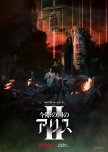(review of both seasons) A testament to what brings us to live
Prior to binging this in two days, had already heard the main theme by Yutaka Yamada via YouTube uploader Em-Ost II, over a year ago - thought it was nice, but didn't think much of this "Alice in Borderland." Looked like a zombie show, and am not the biggest fan of the genre. Most of two seasons in, I realize that with the zombie genre, the death game genre has a pitfall - that the core human elements become restricted by nature, and certain types of questions, certain monologues, become expected. I even got spoiled on what this all really was by the current top comment to the manga on mangasee123 very early on, and followed along in the manga for the last few chapters/episodes. As I re-listen to my favorite track, "THE LOOKING GLASS" (which is even more fitting, being the name of Lewis Carroll's sequel), which only plays during the interrogation of life, and why we live it, I think of what a journey this was. For the majority of these sixteen episodes, which I saw on Netflix through my brother's account over two days, I ranted inside my head how I'd start this review: that this is probably one of the worst TV series I've ever seen. A lot of it was deathly boring, I'm not used to the way Japanese people talk in live action, it's very different from anime - there's this lilt to it - a lot of the characters seem one-note, although Chishiya my absolute favorite was always a delight - having seen Squid Game and Deadman Wonderland, Mirai Nikki and read I Am a Hero, and the epic Gantz twice, to name some others - this seemed to pall in comparison. Given its title and clear rewrite, this work becomes less another installment in this grisly subgenre which leaves little to the imagination, and more a work of... the human act, and I highly recommend reading along in the manga for the last few chapters, or at minimum reading Ch. 65 after episode 16, for while you don't have to have read the original (Alice in Wonderland), I'd only seen the Disney and that one Jack Sparrow adaptation, the "ending" to this series might be apparent from the beginning - but you keep watching, and while I was so bored and dismayed at times, the second season ramped it up, and some of the games were actually exciting. It's strange listening to Yutaka Yamada after experiencing his work in Tokyo Ghoul, Great Pretender, Babylon, and Vinland Saga (for a live action), but he delivers when needed as always and at times, I thought too good for the show; I also thought the acting by some of the cast was extremely forced, but all in all there are moments that are truly beautiful, which is why I'm looping the abovementioned track to get in the review vibes. This is my first Japanese live action series, and I would not necessarily recommend the manga, as while it has some additional details, for experiencing the death matches and characters' emotions, still black and white can't do it justice. I seriously considered dropping this series after season 1, and almost wrote a review then; but, depressed as I was anyway, I continued. I read on MAL from a review of the manga that this is best for either fans of the genre or those who are struggling to get through life; and of the examples stated above, this honestly might do it the best, not in terms of the game mechanics or the excitement but in terms of what Arisu goes through to learn the meaning of these games. Ultimately you're just watching this for entertainment, maybe some of you like me to derive some meaning from it, attempt to wrest it into your personal life and how you act the next morning as it's past 4am. My eyes hurt and I'm tired... but I'll keep on going. Life the way I live it, by constantly thinking of what to do next, may come down to more than two choices but I must always keep in mind who I am. Because I am alive.
If Everything Everywhere All at Once shows the power of fictional metaphor through audiovisual storytelling, then Alice in Borderland shows the power of storytelling itself. That we will continue to tell ourselves stories to make sense of the world we live in.
If Everything Everywhere All at Once shows the power of fictional metaphor through audiovisual storytelling, then Alice in Borderland shows the power of storytelling itself. That we will continue to tell ourselves stories to make sense of the world we live in.
Questa recensione ti è stata utile?







